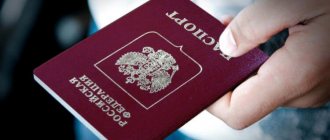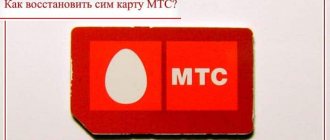Risks and disadvantages of using unregistered SIM cards.
When purchasing a SIM card at a mobile phone store, store employees ask you to provide your passport. This is necessary to register a SIM card - the owner’s passport data is linked to the phone number. This is how an agreement is concluded between the telecom operator and the subscriber.
If there are any problems with the phone number, the real (registered) owner of the SIM card can contact the operator and have the SIM card restored in a matter of minutes. Also, registered SIM card owners have no problems withdrawing money from their phone balance.
However, some people want to remain anonymous and not register a SIM card upon purchase. This is especially true for visitors and subscribers who have many numbers for different purposes.
The law is not written
“Sim cards” without a passport, free!” — every now and then sellers appear on trains. “Beautiful rooms without a passport, cheaper than in the salon!” — street vendors at train stations, metro stations, and shopping centers attract buyers. Although amendments to the Law “On Communications”, which prohibited the sale of SIM cards by hand and obligated the operator to record all passport data of a new subscriber, came into force on January 1, 2014, the black market for mobile numbers did not cease to exist. It is these “anonymous” SIM cards that are usually used to commit crimes, including terrorist attacks.
Underground passage near the VDNKh metro station. At a distance of three meters there are two men selling chargers and SIM cards from three mobile operators: MTS, Beeline and Megafon. Such sellers do not have documents. Cards are sold for 200 rubles. a piece. I buy three at once. To my question, how to use a SIM card if it is not actually registered to me, the seller answers that I can enter my passport data myself when activating the number. But after the following remark: “Isn’t it forbidden to trade numbers like that?” — he abruptly breaks off the conversation: “What difference does it make whether it’s possible or not! Let’s pay the fine - it’s not that big (from 2 to 5 thousand rubles - Ed.) - and we’ll continue to stand!” But those who could punish the sellers were not around.
After making the purchase, I called the support services of all three companies and honestly told about what I had done. Surprisingly, no one there had any desire to punish the sellers. All operators only advised you to come with your passport to any communication shop and register the number in your name in order to become its legal owner.
Lawless zone: why do mobile frauds flourish in Russia?
Read also
Is it possible to buy a SIM card without a passport?
According to the law of the Russian Federation, it is impossible to buy a SIM card without providing passport data. From 2021, penalties will be imposed for purchasing an unregistered SIM card. For individuals, the fine will be 1,500 - 2,000 rubles, for legal entities - from 30,000 to 40,000 rubles.
Despite legal restrictions, you can buy a SIM card without registration in some underground passages, at bus stops and other places. SIM cards are sold in stalls and boutiques with various accessories for smartphones, and sellers often do not ask for a passport for registration.
You can buy an unlimited number of SIM cards at one time. SIM cards that are sold “illegally” are already registered, often to legal entities. Front organizations purchase large quantities of SIM cards for corporate purposes to distribute to their employees. Sometimes after this, such phone numbers are sold on the secondary market with a slight markup in price.
You can check the real owner of the SIM card in your personal account of the mobile operator. Usually the owner is an organization or an individual entrepreneur.
Goodbye money!
All purchased SIM cards turned out to be working. But if MTS and Megafon still had money in their accounts (30 and 50 rubles, respectively), then on Beeline I was surprised to find a negative balance - minus 4.45 rubles. It turns out that someone spoke on it before me.
Question answer
How can you be deceived by SMS?
The press service (Beeline) confirmed that the SIM card was not sold on behalf of the company’s official dealers and was already registered to a dummy. “In fact, you do not become the owner of such a number and with a high degree of probability you can lose it at any time. At the same time, subscribers often provoke sellers to sell them a number without presenting a passport or give false information without presenting a passport, explains Anna Aibasheva, press secretary . “Having bought a SIM card in person, the user will encounter difficulties when being serviced by his mobile operator.” “A number purchased in this way will never be yours - you will not be able to connect/disable the necessary services, roaming, you will not be able to choose the optimal tariff, and ultimately you will have to part with this SIM card, since operators are getting rid of faceless numbers,” explains Sergey Grebennikov, head of the Regional Public Center for Internet Technologies (ROCIT) .
But the biggest danger is the insecurity of funds. A SIM card without a passport can cost you a lot: every year, scammers debit about 10 billion rubles from the accounts of mobile subscribers. The user deposits a certain amount into his account, but in fact only part of it ends up there, while the rest goes into the pocket of the scammers. There are a lot of schemes, the most common is that the anonymous number sold to you is already linked to the bank account of a stranger. “In this case, it is impossible to return the money,” says Konstantin Leiman, a lawyer at the Moscow Legal Center . “The only thing a subscriber can do is ask for an account statement from the operator to understand how much money he has lost.”
Photo: www.globallookpress.com
The case of the left SIM card
In his next review of the decisions of the Supreme Court, Artem Karapetov writes the following.
===============================
Ruling of the Supreme Court of the Russian Federation dated January 14, 2020 No. 5-KG19-216, 2-3488/2018
If the mobile operator re-issued the SIM card and gave it to a person not authorized by the subscriber, which allowed the latter to maliciously authorize the phone to access the subscriber’s bank card and write off a certain amount from it, then the subscriber may demand reimbursement of the stolen funds from the mobile operator.
A comment:
Such a case has already happened (Determination of the SKGD of the RF Armed Forces dated April 24, 2021 N 5-KG18-41), and now the Armed Forces repeats its position. In general, everything is correct. Issuing a SIM card to an unauthorized person is a violation of the contract. The merchant is liable for breach of contract without fault. So there must be liability for damages. In some cases, it can be cut under Article 404 of the Civil Code of the Russian Federation in a situation of mixed guilt or violation of loss mitigation requirements, but the general rule assumes the responsibility of the mobile operator. A bank may also be jointly and severally liable if its authentication system is not reliable enough. In a previous case, the SKGD of the RF Armed Forces recovered damages jointly and severally from the mobile operator and the bank.
===============================
In my opinion, this matter is not as simple as it might seem at first glance.
As far as can be understood from the text of the judicial act, the subscriber did not have an agreement with VimpelCom. If so, all discussions about the responsibility of a merchant for violating a contract without guilt miss the mark.
There is an intermediate link in the case, a certain MTK-Mobil LLC. This is a small telecommunications company that resells VimpelCom services to its clients.
“Our company specializes in connecting and servicing individuals and legal entities under tariff plans of the Beeline cellular network (communication services are provided by VimpelCom PJSC); providing profitable and reliable dealerships and partnerships in cellular communications.”
The Sudact states that the plaintiff had an agreement with MTK, and not with VimpelCom. And MTK (one must think) already had an agreement with VimpelCom.
VimpelCom reissued the SIM card at the request of a person who came to the VimpelCom office with a power of attorney from MTK. There is not a word in the Sudact that this power of attorney was false; on the contrary, “the court established” that the card was reissued “on the basis of a power of attorney issued by the general director of MTK.” And if the power of attorney was genuine, did VimpelCom really violate any agreement?
In the Sudact of the Supreme Court, I note that there are no references at all to any provisions of any agreement. There are only references to the norms of various laws and regulations.
In addition to the usual verbal rubbish, the Sudact contains a reference to the rule on an agency agreement (Article 1005 of the Civil Code), according to which “under a transaction concluded by an agent with a third party on behalf and at the expense of the principal, the rights and obligations arise directly from the principal” (apparently, This thesis became decisive in the case). However, I will add on my own behalf, the same paragraph states that “under a transaction made by an agent with a third party on his own behalf and at the expense of the principal, the agent acquires rights and becomes obligated.”
On whose behalf did MTK enter into an agreement with the client? In Sudakt, this question is the key to the correct resolution of the dispute! — is not explored or even mentioned. What kind of agreement MTK had with VimpelCom remains a mystery.
But on the MTK website there is their standard subscription agreement (for a prepaid service system). In its first paragraph the following is written.
“In accordance with the terms of this Agreement, the Company, on its own behalf, provides the Subscriber with the opportunity to receive Beeline communication services from the Network Operator, and the Subscriber pays for the received communication services under the terms of this Agreement.”
(If anything, payment for services under the contract is made to the account of the Company, not the Operator.)
If so, then MTK makes a transaction with the subscriber “on its own behalf,” which means that VimpelCom is not responsible to the subscriber for this transaction.
Of course, in any case, tortious liability of the telecom operator to the subscriber is possible if the operator is at fault, but in this case, VimpelCom’s guilt, to put it mildly, is not obvious.
If for some reason the client entered into an agreement not with the telecom operator itself, but with an intermediary, should this intermediary be required to demand compensation for losses in case of violation of the agreement?
I am not ready to say unequivocally that the Supreme Court resolved the case on the merits erroneously; there are too many understatements in the facts. But it is impossible to call this pudact “correct” for sure.
P.S. In the previous case referred to by A.K., the contract was concluded directly with the operator, so these problems did not exist there. By the way, from that case we can conclude that the bank is responsible depending on its guilt.
“The bank is obliged to prove that it has taken all measures for the proper fulfillment of the obligation with the degree of care and prudence required of it by the nature of the obligation and the conditions of turnover.”
================
Update:
In response to criticism from Artem:
In principle, two types of contracts concluded by intermediaries are possible.
The first is an agreement on behalf of the principal and at his expense. These are the contracts that we usually conclude in all kinds of stalls when buying a SIM card. This is an agreement with the operator, even if it is signed by the seller from the stall by proxy.
The second is an agreement concluded on behalf of the intermediary, although at the expense of the principal. Such agreements can be concluded by small telecommunications companies that resell other people's services on their own behalf. The client’s contract is concluded with the intermediary, but not with the principal. This is the standard MTC agreement posted on their website. (Of course, the intermediary must have his own agreement with the principal.)
The copy-paste from the regulations that we see in the Supreme Court’s definition really suggests that the Supreme Court considers the disputed agreement to be a contract of the first type.
But those meager scraps of facts that are actually communicated to us in the sudacts, in my opinion, are compatible only with a contract of the second type.
At the very beginning of the Sudact, the Supreme Court directly stated that the plaintiff had an agreement with MTK (and not a word that this was an agreement on behalf of VimpelCom). A person with a power of attorney from MTK came to VimpelCom to receive a new SIM card, and VimpelCom accepted this power of attorney. The appeal report states that the “owner of the number under the contract” (obviously with VimpelCom) is the “organization” (obviously MTK).
If we add to this the description of the company’s profile and the standard agreement that we find on the MTK website, there is almost no doubt left.
Most likely, the agreement was concluded by an intermediary on his own behalf. If so, then the Supreme Court simply did not understand the situation and resolved the dispute erroneously, stuffing the Sudact with irrelevant quotations from regulations.
Where is the product from?
How do scammers get numbers to resell? “Megafon provides communication services on the basis of concluded agreements,” Tatyana Zvereva, head of the press service, . “But such situations cannot be prevented 100%: it is unrealistic to monitor the further transfer of a SIM card to third parties by both legal entities and individuals. If we detect that kits are being distributed by hand without concluding an agreement, we fine the counterparty and suspend the provision of services to such numbers.” (However, no one blocked my number. - Author.) But they didn’t find time to talk to us about the problem of “singed” SIM cards. Maybe we shouldn’t tighten the law, which exists “for show,” but rather figure out who should punish violators and how?










